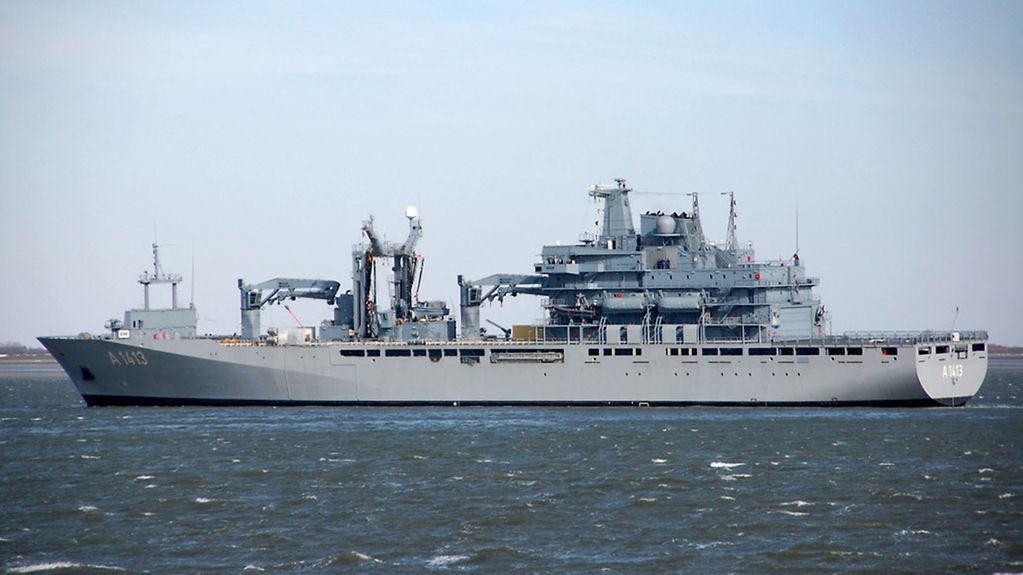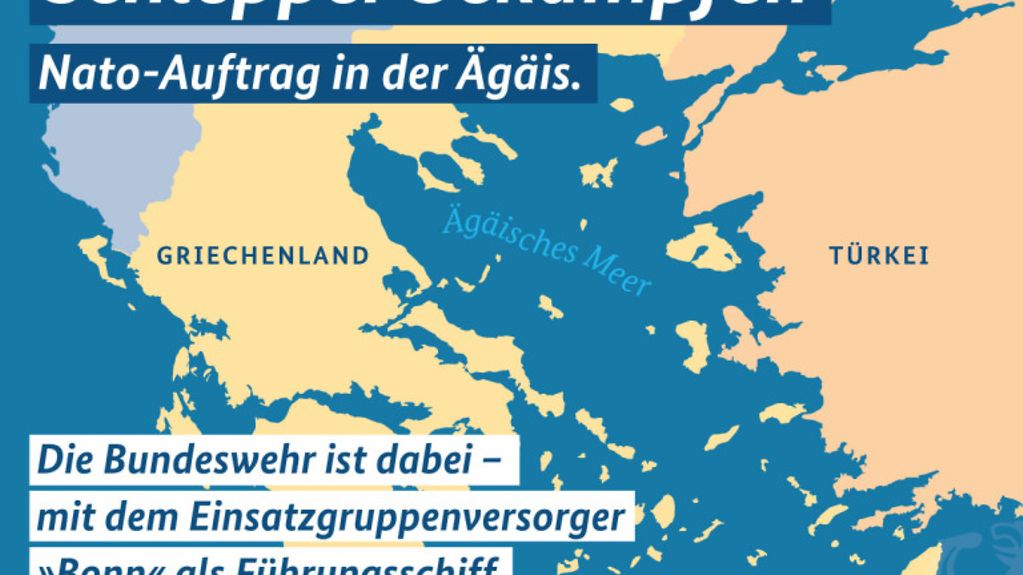NATO in the Aegean
NATO has presented details of planned activities in the Aegean to help cut the lines of illegal migration. According to these plans NATO vessels will be able to deploy in future in Turkish and Greek territorial waters.
2 min reading time

NATO's flagship in the Aegean, the combat support ship "Bonn"
Photo: Bundeswehr/Fiebeler
NATO will thus make a valuable contribution to tackling human traffickers, said Federal Defence Minister Ursula von der Leyen.
Meeting during the night in Brussels, representatives of NATO member states agreed on the guidelines for maritime surveillance in the Aegean. Turkey, Germany and Greece proposed the measure to NATO.
Ships to perform reconnaissance, monitoring and surveillance duties
The maritime units of NATO’s existing Standing Maritime Group 2 left for the Aegean following the fundamental decision taken by NATO defence ministers on 10/11 February.
In future the Standing NATO Maritime Group 2 (SNMG 2) will be conducting primarily reconnaissance, monitoring and surveillance duties in the area. Information gathered will be made available to the Greek and Turkish coastguards and to Frontex, to support them in their efforts to combat illegal trafficker gangs.
NATO currently has four standing maritime groups. They are part of NATO and are international in their composition. The Standing NATO Maritime Group 2 is one of the four. It operates primarily in the Mediterranean but can be deployed immediately in other areas if required. The SNMG 2 is currently under the command of the German Navy Rear Admiral Jörg Klein on the combat support ship "Bonn".
NATO making a valuable contribution
NATO has excellent surveillance facilities, stressed Federal Defence Minister Ursula von der Leyen. "This will enable it to make a valuable contribution to ensuring that the local coastguards responsible and Frontex are successful in the fight against smugglers and traffickers in the Aegean."
The NATO vessels will neither stop refugee boats nor turn them back. They will only gather data and monitor refugee flows. In this way NATO is to act as a link in the chain, facilitating cooperation between the actors involved and ensuring more effective information sharing.
Germany is currently providing the flagship. About 210 German soldiers are stationed on the 174 metre long combat support ship "Bonn". It was first commissioned in 2013 and is the German navy’s third modern vessel of this sort, following the "Berlin" (commissioned in 2001) and the "Frankfurt am Main" (commissioned in 2002).
Mission planned in detail

NATO in the Aegean
Photo: Bundesregierung
NATO Secretary General Jens Stoltenberg commented on other important details. Should a vessel under NATO command meet a refugee boat in distress, rescue measures will naturally be initiated. Should vessels operating as part of the NATO group rescue refugees attempting to cross from Turkey, the latter will generally be handed over to the Turkish authorities.
In cooperation with Greece and Turkey, the NATO ships will be allowed to operate in Greek and Turkish territorial waters. Jens Stoltenberg added that the Turkish ships will not operate in Greek territorial waters, and vice versa.
Work will commence swiftly
Experts from NATO and the member states involved must still lay down the time schedule for the mission. Ursula von der Leyen was optimistic that the mission can begin swiftly. "The NATO group, under German command can begin its work in a few days; preparations are continuing at top speed."